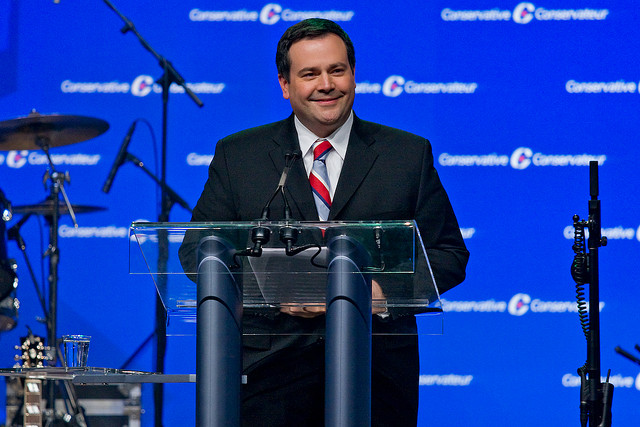Mark it in your calendars folks. March 25, 2014 is the day that the Canadian labour shortage** myth officially died. (It may, of course, be resurrected as a zombie).
Responding to a Parliamentary Budget Office report that refutes the existence of a labour shortage or skills mismatch in Canada, Jason Kenney claims the government never suggested any such thing.
Jason Kenney on March 25th, 2014: “@kenneyjason 1/ We consistently say the aggregate labour market information indicates there is *not* a general labour shortage in Canada @globepolitics“
Except that Minister Finley repeatedly suggested that it was one of the biggest issues facing the Canadian economy.
Diane Finley speaking in April 2013: “Canada is facing major skills shortages that are hurting our economy. “
And while Jason Kenney has been slowly backing away from that position, he uses the more specific “skills mismatch”** boogeyman when it proves convenient.
Jason Kenney, speaking in October 2013: “Our government is committed to fixing the skills mismatch in Canada where we have too many Canadians without jobs and too many jobs without Canadians.”
A little bit of history re-writing never hurt anyone, as long as we get to the right answer in the end, eh?
Yes, and no. It’s great that the Minister for Employment and Social Development has acknowledged that there is no broad labour shortage in Canada. But, the major cornerstones of this government’s economic policy — the Canada Job Grant, EI Reform, and Temporary Foreign Worker Program for example — still rest on the notion that labour shortages are the most pressing economic problem we’re facing.
The one skill that is in short supply, especially among young workers is “experience,” and it’s incredibly hard to come by. Budget 2014 addresses about 0.5 per cent of the need for jobs among young workers with internship supports. Good luck getting one of those.
So what should this revelation mean for government policy? First, government needs to recognize that in much of Canada there is a job shortage, and an employer training shortage. Programs and policies should be re-oriented around that reality.
The Canada Job Grant could have been an excellent pilot project to support employer-led training initiatives, but due to its poor design is more likely to replace existing employer training of current employees than to support new training initiatives.
Cuts to EI mean that too many unemployed workers are falling through the cracks, without income support or re-training support. Even those lucky few who receive EI often face lengthy delays in receiving benefits because Service Canada staffing levels are insufficient to meet bare-bones service levels.
The single most important improvement to EI would be a uniform entrance requirement. Urban workers live in areas with low unemployment rates, but fierce competition for precarious and low-wage jobs. Across Canada, more and more unemployed workers are new labour market entrants and labour market re-entrants, who need 910 hours to qualify for EI. A uniform entrance requirement would open EI up to many workers that have paid into the program, and give them access to invaluable training supports.
Cutbacks of public services put a drag on economic growth and full labour market recovery, as the PBO itself has documented.
Once we’ve accepted a job shortage, it would be fantastic if we could also accept a job quality deficit, and start talking about what we can do to foster well-paid and secure jobs for workers in Canada.
I leave you with Toronto artist Mohammad Ali’s young worker anthem “Precarious Work”.
** As the PBO document points out, labour shortages and skills mismatch are two different phenomena — labour shortages occur where there are not enough workers available regardless of skills, and skills shortages occur when there are enough workers, but not with the necessary skills.
Photo: mostlyconservative/flickr



